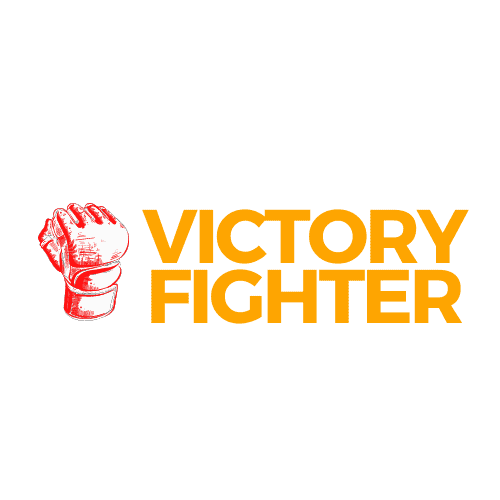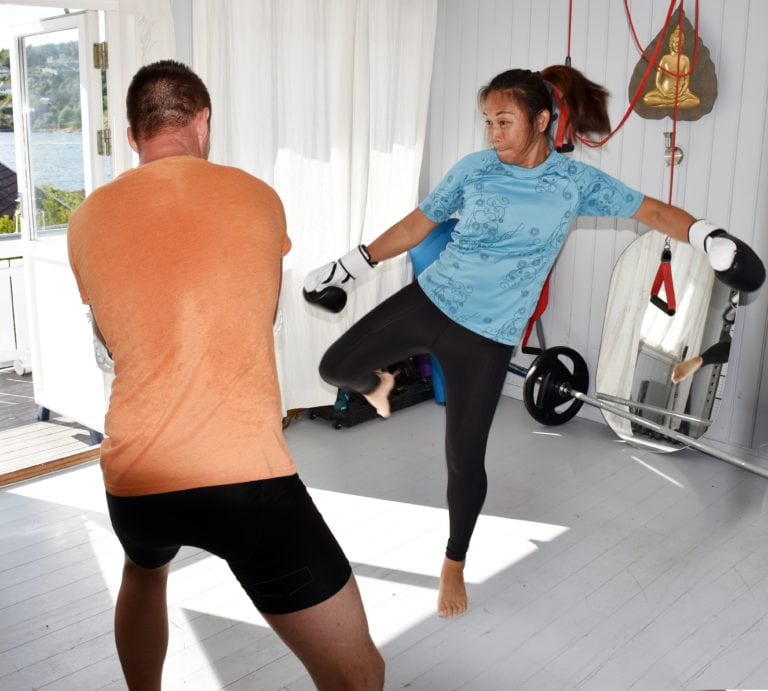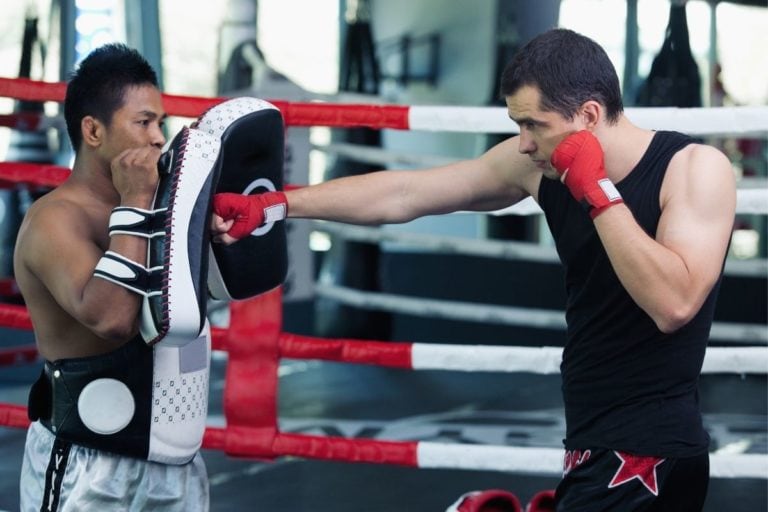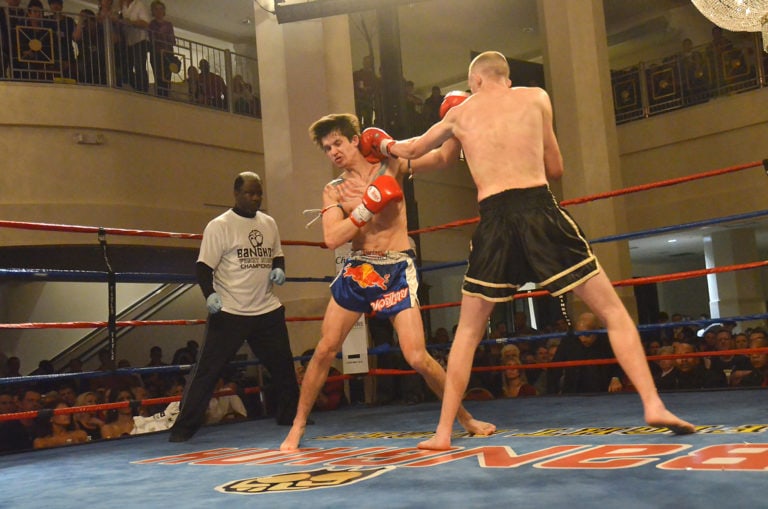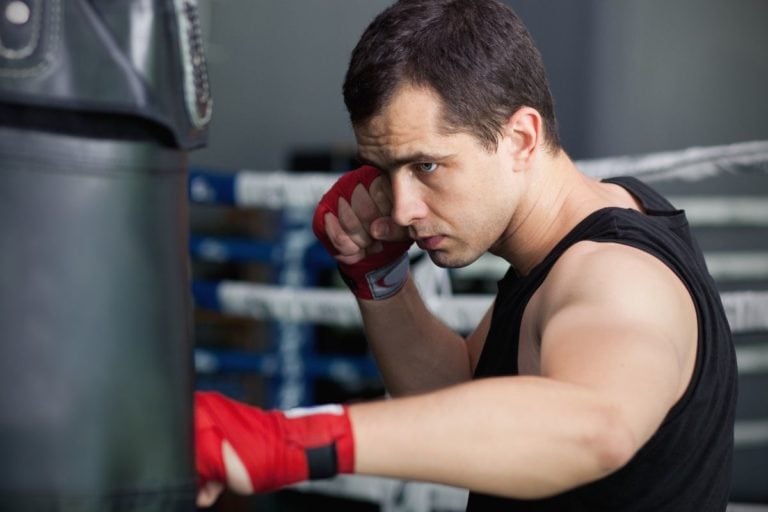How to Eat Like a Muay Thai Fighter
Muay Thai fighters have to be in peak physical condition to be able to compete, and their diet is a big part of that.
While there are no specific dietary requirements for Muay Thai fighters, they typically eat many protein-rich foods like chicken, fish, and eggs. They also consume plenty of vegetables and fruits to stay healthy and energized. Hydration is also key for Muay Thai fighters, so they drink lots of water and avoid sugary drinks.
Of course, every fighter is different and has different dietary needs. Some may need to bulk up, while others may need to cut weight. But as long as they’re eating nutritious foods and staying hydrated, they should be able to perform at their best.
How Does Breakfast For A Muay Thai Fighter Look Like?
A typical Muay Thai fighter’s breakfast would usually consist of some sort of protein such as eggs or chicken, rice, and vegetables. This type of breakfast is designed to give the fighter sustained energy throughout their training session.
What might surprise you is that most Muay Thai fighters skip breakfast altogether since they can either choose between sleep or breakfast, and sleep is a priority when you are training 2 to 3 times a day. If they wanted to eat breakfast, they would have to wake up an hour before the morning run, which is not an option for most.
However, those that do decide to have breakfast before their morning run, which consists of about a 5 to 10 kilometer run every day, usually pick a lot of carbs as their choice for breakfast. A usual pre-workout breakfast might consist of whole wheat bread/toast with honey and a sliced banana. This will give you enough carbs to power you through your morning run.
After the run, most Muay Thai fighters go for an hour or an hour and a half workout in their gyms. The training mostly consists of bag work, pads work, clinch, and some strength training. Having worked out more in the first few hours of the day than most people do in the week requires A LOT of calories and vitamins to help your body recover and reset.
After the run, it is time for the real breakfast of the day, depending on if you had a pre-workout one already or not. A typical Thai breakfast usually includes some type of rice dish, a protein such as eggs or chicken, and a variety of fresh fruits. Some popular breakfast items include congee (a rice porridge), omelets, and fried rice. While Westerners may be used to eating sweet foods for breakfast, such as pancakes or waffles, Thais typically opt for savory dishes instead.
Another popular breakfast dish is grilled salmon with stir-fried pumpkin and rice. Fighters usually opt for fish and chicken as their main source of protein rather than beef or pork when they need to cut weight before a fight since the earlier options have less fat.
Lunch
After the fighters had breakfast at around 10, most of them go to rest for the next 2 to 3 hours. Most of them go to sleep since sleep is a priority for muscle recovery. Since the next training is around 3 PM, you need a fast-digesting form of carbs, meaning they are of simple structure. This is basically your lunch. The options include a banana, avocados, berries, or dragon fruit. You can maybe make it into a shake by adding almond or oat milk, which is easier to digest than regular cow milk.
Since the fighter go train about 2 hours after lunch, they might also have another quick but small snack before it. Maybe a wholewheat toast with some honey again. It depends on the fighter, but the rule of thumb is to make your lunch relatively smaller.
Dinner
There are quite a few options for dinner that a Muay Thai fighter can choose. It depends on whether they are cutting weight, which is especially brutal for Thai fighters, or they may be in between camps. If the fighters are cutting weight, chances are they will be eating smaller portions of rice and lean meat or fish; sometimes, if the fighter has a lot of weight to cut before a fight, they might eat just soup made out of rice. Together with hours of training, horrible heat and humidity, and strict weight cutting practices, this can endanger the fighters by making them collapse.
If the fighter is not cutting weight, they could opt for a street food type of dinner. Few of the examples are: Pad Kraprao, Khao Kai Yang, Yam Kai Yang. Pad Kraprao is one of the most popular dishes among Muay Thai fighters. It is a dish made with minced meat, chili pepper, garlic, onion, and holy basil leaves. You can also add an egg or two for an extra dose of protein. Khao Kai Yang is another popular dish among Muay Thai fighters. It is a grilled chicken dish that is served with sticky rice and dipping sauce. Yam Kai Yang is a spicy Thai salad made with grilled chicken, chili pepper, onion, and mint leaves. It is a popular dish among Muay Thai fighters because it is both healthy and delicious.
Dinner for most Thai fighters is usually at around 8, one hour after the last workout session. From 8 PM until 10 PM, when most of them go to sleep, they have ample time to digest some of the food they have eaten to fall asleep easier and get the quality rest their body needs.
Caloric Intake Is King
The number of calories you consume each day matters more than anything else regarding weight loss. A caloric deficit, or consuming fewer calories than you burn, is the key to losing weight. You can create a caloric deficit by eating less, exercising more, or doing a combination of both. For most people, a combination of diet and exercise is the best approach.
You need to create a caloric deficit of about 500 calories per day to lose weight. This can be done by eating 250 fewer calories and burning 250 more calories through exercise. Or, you could eat 200 fewer calories and burn 300 more calories. It is not uncommon for the Thai fighter to go into severe caloric deficits a few weeks before their next fight. Those deficits can climb up to about 2000 calories per day, which is very tough on the body and the mind. That is why keeping a healthy diet or nutrition plan during your whole life, not just before an upcoming fight, is a must.
Since the Thai fighters often end up working out for more than 3 hours a day, they burn a significant amount of calories, but they also significantly damage their muscles through all the hard work. In order to not lose the hard-earned muscle, they need to eat the perfect amount of calories that their body needs, and the correct amount of protein is a must. The perfect amount of protein for someone who trains a lot would be their bodyweight in kg multiplied by 1.5 or 2. That equation will give you the number of grams of protein you need to consume daily if you want to keep or build your muscles.
Things To Avoid
But if the Thai fighters burn so much energy, why do most of them avoid junk food? There are a few reasons for this. The first reason is that junk food is loaded with empty calories. These calories do nothing to help your body recover from a hard training session or fight.
The second reason is that junk food can lead to weight gain. This is a problem for any fighter, but it is especially a problem for Muay Thai fighters who need to make weight for their fights. The last thing you as a fighter want is to train the whole day just to offset it off with a greasy dinner that lacks the necessary vitamins and minerals for your recovery.
The third reason is that junk food can negatively impact your energy levels. Fighters need all the energy they can get to train hard and perform at their best. Junk food will only drag their energy levels down, making them sluggish to train and perform optimally.
Even though I think you should avoid it like the plague because it will, in the long term, damage your teeth, your blood sugar levels, and so forth, some people swear that it helps them recover their sugar levels after a workout quickly. We are, of course, talking about soda pop. The soda pop might replenish your energy a little bit after a training session, but if you drink it too late, it might keep you up at night because of the sugar and the caffeine content, and trust me, as a Thai fighter, you do not want that.
It would also be logical to avoid things like candy or chips. One is filled with sugar, while the other is with unhealthy fats. It is okay to have them in moderation, especially if you train intensely, but do just that, keep them in moderation. There are also a lot of sugary drinks in circulation in Thailand, drinks like Cha-Yen, which is a Thai-style tea that has a lot of sugar in it.
Supplement Recommendations
There are certain supplement recommendations any person, not just a fighter, should have in their daily routine. Since it is hard to get all your vitamins and nutrients through your daily food intake, it is recommended to supplement those vitamins and nutrients.
Usually, the first recommendation we make to people is to supplement vitamin D because of our sedentary lifestyle and our location; most of us are vitamin D deficient, which causes a whole slew of problems for ourour bodies. However, if you are a Muay Thai fighter based in Thailand, you most probably do not need to worry about the lack of vitamin D since you get plenty of sunlight daily.
Other supplements we recommend are Omega-3 fish pills, vitamin B, vitamin C, calcium, magnesium, and zinc. They mostly come in the form of a pill, so taking them before sleep shouldn’t be a problem. Another big recommendation is Creatine Monohydrate. There are numerous studies done on this supplement, and it really does wonders. It helps you push your body further, it also increases your strength and your endurance, and it is also beneficial for the brain. Taking 5 grams a day could really help your recovery and your performance.
Water Intake
Water is king in Thailand. It is recommended to drink about 3 liters (a little bit less than a gallon) of water a day if you train for some sort of sport. Now, if you train a sport like Muay Thai that consists of 2 to 3 workouts a day in a hot and humid environment, you can imagine that drinking plenty of water is a must. Muay Thai fighters drink up to 5 liters of water a day. Some of them add salt to their water since salt minerals are lost when you sweat, and adding salt to the water is a good way to replenish them. Also, since the fighters train so much, it cannot hurt to add some BCAA to your water to keep your muscles from breaking down for energy. BCAA helps build your muscles, decrease muscle soreness and fatigue, and give a nice taste to your water.
Conclusion
The food and the timing of meals really depend on each particular fighter. A lot of them skip breakfast to get as much sleep as possible, and the first meal they have is after their morning run and training session. Some fighters do eat before the morning run, but that is mostly a pre-workout snack consisting of simple carbs that are easy to digest. Thais usually eat heavier breakfast and dinner while lunch is kept pretty light. Their breakfast usually consists of a good source of protein like fish or chicken, rice, and some vegetables. Lunch is usually a shake or fruits. While dinner can be again a lot of rice with a source of protein and vegetables, or if you are not cutting weight, it can also be a little bit greaser and have pork and stir fry rice in it. The most important thing to keep in mind is to find the meal plan that works for you and your needs.
